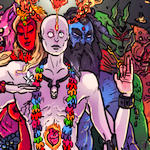|
Your forgery kit haver will love the painting though, if the DM rules it’s a valid target
|
|
|
|

|
| # ? Jun 5, 2024 19:48 |
|
The past few pages have delved into the martials and how they fall short, and I think it's been pretty interesting, but Barbarians were only lightly touched on. I'm curious what thoughts people had about the class. I've been playing one in a Saltmarsh game, and I feel like the class itself is "broken" in that it needs a conceptual redesign; when Rage isn't available you're just a bad Fighter, but there's very little reason to ever -not- activate it if the battle requires any effort, so it's not an interesting resource either. Tossing superiority dice at them doesn't seem like it really fixes anything, because it seems like the heart of their issues stem from Rage being so binary. Did other editions ever expand on them, or were they always basically an on/off switch?
|
|
|
|
please knock Mom! posted:
AHAHA hey guys did you know if you use completely different rules the game can be anything 
|
|
|
|
Elfgames posted:AHAHA hey guys did you know if you use completely different rules the game can be anything ask your DM to make the game gud
|
|
|
|
Kaysette posted:ask your DM to make the game gud well almost anything
|
|
|
|
Kaysette posted:ask your DM to make the game gud this is the edition that tells you to do that unironically, yes @coolness averted: 4e expands on the barbarian, obviously. 3e/PF have a similar on/off problem. 1e's barbarian didn't even get rage!
|
|
|
|
Celebrity Ghost posted:Barbarian During a round in which you make or are the target of any attack, gain a Rage die. Your rage dice are d12s. You may activate rage abilities by expending one or more rage dice when you make a melee attack or an attack with a melee weapon or a melee weapon attack or a weapon attack in melee or that kind of thing. <list of rage abilities involving mighty thews, costing one to three dice> Whenever you expend rage dice, roll them. In addition to all other effects, your opponent takes damage equal to the highest single value rolled.
|
|
|
|
Elfgames posted:AHAHA hey guys did you know if you use completely different rules the game can be anything Yes, this is the basis for my campaing
|
|
|
|
Elector_Nerdlingen posted:During a round in which you make or are the target of any attack, gain a Rage die. Your rage dice are d12s. I like this conceptually, where you get special powers in exchange for being attacked. Maybe most of the rage powers require using a bonus action, and you can also use your bonus action to hype yourself up, generating a rage die ex nihilo. You can also do things like let the character hold more dice in reserve as they level up, gain dice when they roll initiative, etc. Basically just want to make sure that the barbarian doesn't feel hamstrung if enemies decide to avoid them. I'd be inclined to make the powers unlock with level -- basically you get a spell progression and higher-level spells cost more dice to cast. The nice thing about this IMO is that you can also make the direct damage from spending dice scale up. Spend two dice? Roll them both, add that damage on. Though the size of the die might need to not be a d12. Lord knows they're the least common die in most bags so you don't want to be rolling too many of them anyway. Powers could be things like bypassing damage resistance (enemy is immune to nonmagical damage? Hit him really hard, he'll change his tune), hitting a guy with another guy (make an improvised weapon attack; if successful, both targets take 1d4 + rage dice damage), removing harmful magical conditions (puny wizards can't charm me!), leap attack (short-range teleport + attack), sunder the earth (as a reaction when targeted by a ranged attack, tear out a piece of the landscape to provide full cover)...
|
|
|
|
TooMuchAbstraction posted:I like this conceptually, where you get special powers in exchange for being attacked. Maybe most of the rage powers require using a bonus action, and you can also use your bonus action to hype yourself up, generating a rage die ex nihilo. You can also do things like let the character hold more dice in reserve as they level up, gain dice when they roll initiative, etc. Basically just want to make sure that the barbarian doesn't feel hamstrung if enemies decide to avoid them. The point was that if you're attacking or being attacked, you're getting dice. You're only missing rage dice if you're not fighting. You're supposed to get them every round unless you're trying to be an rear end in a top hat, and you're supposed to get to use a rage ability every round for a small one, every two rounds for a medium one, and every three rounds for a big one. Gain it fast, use it or lose it. Yes, each ability should scale up with your level, and you should get more abilities as you level. But you should be able to spend more dice to power up any ability. "Expend a rage die to automatically succeed on a saving throw inflicted by a spell or spell-like ability" would be an extremely barbarian ability, as would "expend three rage dice to be completely immume to magic for 1 or 2 rounds". I feel like this stuff is in addition to your attacks. That's why I wrote when you attack. You get to sword fight, and do other stuff, barbarian as gently caress and it avoids the thing that always happens with special abilities where nobody ever uses them because I-attacking is always better. It is inherent to the D&Dness of the D&D that Barbarians use d12s. Using rage dice shouldn't damage the PC. Exception might be as an optional trade-off for effect above and beyond the normal effect. Elector_Nerdlingen fucked around with this message at 05:38 on Nov 18, 2019 |
|
|
|
...poo poo, I need to learn to read, completely missed the "when you attack" part. Yeah, that makes a lot more sense, as does spending the dice as a side-effect of attacking. Mea culpa, thanks for the correction.
|
|
|
|
Sounds good, but you need to add out of combat skills and methods of generating and spending die. Smart rear end noble wizard say something you don't like? Get a die for escalating the situation by shouting back at them, and spend a die for a bonus on your intimidation check. See something that goes against your moral code (aka someone powerful hurting someone weak, someone powerful not expressing their morally righteous strength, or whatever else you believe in)? Get a die for witnessing the act, and spend it immediately when you rush into combat. Fail a strength check? Get mad, and try it again with your free rage die. Humiliated in a social situation? Focus your anger into the most withering insult that is socially acceptable. Maybe for these, have Barbarians take a Source of Rage that gives a general outline for their worldview and what makes them angry, and an additional set of maneuver-like ways of spending rage die out of combat. Although, I guess if you actually implement that, you end up in the same situation as Kaysette posted:ask your DM to make the game gud
|
|
|
|
quote:barbarian Tenik posted:socially acceptable.
|
|
|
|
please knock Mom! posted:Tbh this is where I find out the microcosm of me and my friends playing D&D has shifted a long ways away from what's in the actual books at this point and I didn't even notice until wading into this thread and just assuming we were doing the 'normal' thing. I just assumed everyone did what we were doing and after tallying up the things we don't really use that much I see that I'm way wrong well, Arivia posted:this is the edition that tells you to do that unironically, yes Yeah. This is the thread where in the feels-before-reals edition we refuse to deviate from RAW, yet also talk poo poo on light systems like Strike yet also refuse to gently caress off and play Pathfinder 2 for reasons, and if you ask for creative solutions to common grievances hold onto your butt. You play your table. Period. You meet people, you adapt to what people want to do, and you play your table. It's a breezily light grid-game with an element of improvisational RP that can be as prominent or backgrounded as people are comfortable with, which is why so many people are comfortable with it. please knock Mom! posted:Yeah, I'm actually joining a 5e game with some new friends in a new city I've never played with so getting reamed just now helped a lot with knowing what to expect and how to behave/plan ahead. I've played literal AL campaigns that played like you described, where it's largely scenes and ability checks and maybe one token combat per session. Nobody from Hasbro came by to gently caress us over and invalidate the game. Maybe your new table is more murderhobo, maybe they're more RP heavy. Play with them and find out, you'll probably have fun either way as long as they're good people!
|
|
|
|
theironjef posted:You can complicate the loot table if you want your efficiency minded players to decomplicate it, but it's just a formalized dance. The only ways to break treasure out of the “how much” syndrome (which is plenty fine for some campaigns) is to make it matter. The “classic” way to do that is ye olde 500 pound gold statue that you have to somehow haul back to town; tracking weight may create complications but in most cases they aren't fun ones. The alternative is to have coinage value and make all the “art objects” matter in other ways, whether for role play (“isn't that the mayor’s missing wedding ring?”) or by embedding clues in art or ritual objects, or by developing the mythology or history of a campaign world. With the right players, finding nonmagical books can be more exciting than anything else because you can learn things that could be useful. Art or banners or furniture or other storied objects can achieve something of the same effect. You can also displace value via character objectives. The “dungeon chef” might value monster meat for recipes, but also find rare herbs and spices personally valuable. I never ran this campaign, but I had a concept built around Antiques Roadshow involving a group of thieving PCs who come into a town, hold an event to identify the value of the locals' antiques and bric-a-brac, and then rob one or two people afterward using one of several schemes to either conceal the theft or implicate a local whose rare heirloom turned out to be worthless. (Varying the scam by purchasing a valuable object for cheap or by arranging to purchase a worthless object from one local for another would also be possible.) World richness is another way to address some of the other non-combat issues being discussed. If open use of wizardry is banned and barbarians, rangers, and fighters all have massive societal support structures while clerics and druids are seen as drudges, the number of things that can be accomplished through role play shoot way up. Given all the evil wizards, cultists, liches, etc running around the typical campaign world, it's surprising more of them don't strictly regulate spellcasters using something like extraplanar beings for enforcement. That's an inelegant solution as it pressures spellcasters toward dungeoneering-only magic, but the typical wizard shouldn't be solving RP problems with Charm Person without expecting that to create problems later. Some utility spells really should be the equivalent of “succeed at a cost” where mundane solutions are preferable.
|
|
|
|
Is this the point where I once again post my whole loving thing about D&D being a series of cultural rituals rather then an actual game because most people playing it are just freeforming and in truth hate the game engine but never realize it?
|
|
|
|
The problem with all the out of combat stuff is that, despite exploration and social interaction being one of the three pillars of the game, there are no rules except for spells that have defined effects, and in the land of arguing with the DM the defined rule is king. If there was a social interaction system besides someone rolling high vaguely on a social skill and that maybe causing good things to happen, rogues and fighters could possibly interact with it and get actual results. If someone managed to make exploration actually interesting via some kind of system, rangers and barbarians could interact with that with actually defined abilities. Instead the entirety of both systems are "argue with your DM that you can use the big numbers on your character sheet, then argue that the number you rolled is sufficiently big for something to happen." If I have to deal with this "subsystem" to get from Happy Town to the Lair of the Evildoers, but my character knows Teleport and can just...teleport to the Lair of the Evildoers, guess which is better? Ultimately the problem will never be fixed until two things happen: -Actual rules for social encounters and common exploration challenges need to be written, and nonmagical characters need to be given abilities that interact with this. This can even come in the form of binary abilities, such as automatically tracking critters/enemies in the wilderness (which is good for DMs because you can advance the plot and let the PCs follow the slavers), telling super lies that everyone believes, whatever. -The classes either need to come with out of combat schticks assigned or there needs to be some kind of opt-in abilities that let you do things out out of combat like let people social good or perform divinations or whatever. I personally prefer the former as you can make classes thematic, but arguing that a fighter should have fewer social abilities because he's good in combat is just an encouragement for fighter players to go play Smash Bros instead of participating in the encounter where the party needs to convince the Duke to lend money or whatever.
|
|
|
|
|
ProfessorCirno posted:Is this the point where I once again post my whole loving thing about D&D being a series of cultural rituals rather then an actual game because most people playing it are just freeforming and in truth hate the game engine but never realize it? It is definitely in the spirit of the thread at this point to mindlessly spam the exact same thing you've said before while adding nothing new, in order to smugly self-congratulate while making the thread nauseously unreadable for yet another page, so yeah, sure, I guess, whatever. Chucklefucka threadshitting for the 1000th time that "hurr durr ask ur GM, lol" are bigger problem for this thread than the thing they are griping about at this point.
|
|
|
|
Good stuff: Running a dnd game with a group of friends since ages and gf joined in. Bad stuff: Theres one player that wont shut up about "back in the day this used to do this/that", he is talking about probably fake memories of adnd. Jesus. Also, is there a software like masterplan?
|
|
|
|
TheGreatEvilKing posted:The problem with all the out of combat stuff is that, despite exploration and social interaction being one of the three pillars of the game, there are no rules except for spells that have defined effects, and in the land of arguing with the DM the defined rule is king. If there was a social interaction system besides someone rolling high vaguely on a social skill and that maybe causing good things to happen, rogues and fighters could possibly interact with it and get actual results. If someone managed to make exploration actually interesting via some kind of system, rangers and barbarians could interact with that with actually defined abilities. Instead the entirety of both systems are "argue with your DM that you can use the big numbers on your character sheet, then argue that the number you rolled is sufficiently big for something to happen." If I have to deal with this "subsystem" to get from Happy Town to the Lair of the Evildoers, but my character knows Teleport and can just...teleport to the Lair of the Evildoers, guess which is better? The problems are three-fold, as I see it: Problem 1: Making social interactions a matter of abstract resolution reduces actual role-play. “I tell the king to double our reward. 32 on persuasion.” So any robust rules system needs greater complexity. Problem 2: Running social interactions as a system like combat can be overcomplicated. You could generate things like “political capital” to substitute for hp and run a “fight” but the D&D combat system is itself insufficiently abstract to adapt in this way. Problem 3: If you have a more detailed version of social resolution that's quite distinct from the combat rules, instead of being abstract, it will coexist with combat uneasily. Trying to intimidate a street gang into surrendering during a combat with them might suddenly trigger both systems at once. This could be fun if done well; I haven't seen a ruleset that could pull both off without using unified mechanics and abstraction. Problem 4: Any articulated system is likely to privilege a “score” based resolution over actual roleplay. If nobody wants to RP the social encounters, that's OK, but many people want to do so, and there should be situations where even the abrasive “dumped CHA” character has something helpful to contribute. 5e can at least give whoever rolls advantage on the check when somebody with bad numbers makes a strong contribution. But making social encounters a matter of “PC with best numbers has a conversation with the NPC while everyone else sits idle” means that combat is the only part of the system that actually involves everyone at the table. All that said, introducing mechanics like “succeed at a cost” would be helpful, and a system that involves a few basic models or outlines the GM applies based on a best-fit assessment could be an improvement. Seeing similar systems (4e skill challenges, the not-good chase rules in the 5e DMG) suggests it'd be as likely to make game play worse.
|
|
|
|
No or minimal rules for social interaction is fine. No or minimal rules for exploration is fine. No or minimal rules for combat, also fine. All this does is say where the focus of your game is. D&D having limited or no rules for everything outside combat would absolutely not be an issue, if it were true. The problem with D&D (well, the problem with D&D most appropriate to this topic) is that there are detailed rules for social and exploration activities, but they're siloed off into isolated spell descriptions, and access to these are unevenly distributed. The most hilarious and obvious of these is Disguise Self. Here's the description for disguise self: Disguise Self posted:You make yourself, including your clothing, armor, Weapons, and other belongings on your person, look different until the spell ends or until you use your action to dismiss it. You can seem 1 foot shorter or taller and can appear thin, fat, or in between. You can't change your body type, so you must adopt a form that has the same basic arrangement of limbs. Otherwise, the extent of the Illusion is up to you. Here are the rules for the disguise kit Disguise Kit posted:Type: Tool Cost: 25 gp Weight: 3 lbs Either of these are fine in isolation. Put both in the same game? It takes real talent to gently caress up that badly.
|
|
|
|
this is encapsulated by my DM and I having an argument over how horse riding works (he thought it took an action to control the horse) while 100 feet away another character was moving 120 ft/action with haste and flight with absolutely no complaints on his end magic gives you fiat to do what you want with extremely well defined parameters, the rest of the game is not designed around that and you are playing varying degrees of calvinball, either make everyone play calvinball or give everyone well-defined ways to opt out of calvinball Operant fucked around with this message at 17:20 on Nov 18, 2019 |
|
|
|
Are we treading new ground here or did you all animate the dead horse to beat it to death, again?
|
|
|
|
Toshimo posted:Are we treading new ground here or did you all animate the dead horse to beat it to death, again?
|
|
|
|
Toshimo posted:Are we treading new ground here or did you all animate the dead horse to beat it to death, again? You are a good poster and I like you, but its not unreasonable for people new to the game and thread to uncover the same issues we've been dealing with since launch. The cycle does get old (and my occasional shitposting doesn't help) but I can't see a trajectory where this doesn't happen.
|
|
|
|
It's amazing that people will have a conversation about the game this thread is for but other people don't like that conversation and inevitably, they and a bunch of lurkers come out to whine about posts. If you want to control the narrative of a thread that badly, maybe this game isn't for you.
|
|
|
|
|
ProfessorCirno posted:Is this the point where I once again post my whole loving thing about D&D being a series of cultural rituals rather then an actual game because most people playing it are just freeforming and in truth hate the game engine but never realize it? I turned back two years and didn't see the entire thing, just tangents against it here and there. Open the floodgates.
|
|
|
Narsham posted:The problems are three-fold, as I see it: If you are going to just Magical Tea Party social interactions then...don't give them any rules, period. No bluff scores, no persuasion, nothing. Get all the numbers out of the system, take Charisma out of the game and run mages off intelligence, kill Charm spells, etc. You can't simultaneously claim social encounters are a pillar of the game and then not actually build that pillar. That said, I agree with your points about a rule set and will add the caveat that I can't see the current D&D design team writing something that wasn't awful.
|
|
|
|
|
Glazius posted:I turned back two years and didn't see the entire thing, just tangents against it here and there. Open the floodgates. I mean, it's just that. People don't play D&D because of it's engine or literally any of its mechanics. They want to say "I am a <race> <class>!" They want to use D&D cultural shorthand - they want to laugh about being chaotic good, they want to be a big gay tiefling, they want a story about how they made or failed a saving throw. The actual mechanics not only don't matter, they tend to only get in the way of what's really desired. Think of how many people brag about their great games that involve on dice rolling. That's not playing D&D - that's freeforming, with D&D cultural shorthands and stand ins. It's freeform with a character sheet, because at it's heart, what people really want from D&D, by and large, is exactly that - they want freeform with a character sheet. Hell, look at the big successful D&D podcasts. TAZ increasingly just loving splits from the D&D rules after the first minor story arch, and absolutely nobody gives a poo poo about the dice rolling in Critical Role, which is hilarious given the name. They want to have fun with friends while playing pretend and saying "I'm a big gay tiefling bard who's an absolute mess of a person." And like, at it's heart, there's absolutely nothing wrong with just having fun with friends and bullshitting and freeforming. The problem is that D&D sells you three goddamn books for the ability to bullshit and freeform and then monopolizes that freeform bullshit, full of rules you'll increasingly not use. And I say "increasingly" because, well, that's how most games tend to be. You start rolling for every drat little thing, and funny enough, the longer the game goes on, the less and less you end up rolling for stuff. You get irritated with the mechanics without realizing it - because you're having fun bullshitting and playing pretend with friends - so you unconsciously remove those rules more and more as they irritate you. Eventually, you have that moment of "our best session didn't even involve rolling the dice!" And you never actually examine if you even still need the game (you don't). There's a lot of reasons for it. Part of it is the overall demeaning of "playing pretend" in western culture. Part of it is the demands of capitalism and it's push towards brand identification - you can't just be someone who roleplays, you have to be a D&D fan. That first one, incidentally, is also largely caused by the capitalism's isolationism and marginalization. Part of it is general lack of self awareness - you had fun with your friends, or at least enough fun, so you don't look at that time period critically. There's probably plenty more reasons then those that just don't come to my mind immediately. But the end result is you end up lashed to a game that you put money into and then end up not even playing that game, and then you don't play any other game either.
|
|
|
|
I still stay one of the things 5e should have done and failed to do is just elaborate on the Background design space. What if Background was the 'non-combat' template on which you plugged declarative powers? You've already got a chassis for it, it's just that 90% of Background features are, 'so and so agrees to help you if the DM says so' but the basic idea is there. There just needs to be more of it. What if Background had more than one axis? Like instead of, 'pick you profession and then bolt some personality traits on it' make the personality traits themselves a kind of background. Are you Zealous? Are you Unhinged? Are you Out For Revenge? Put additional Background features onto those personality traits. The answer is right there and they just didn't do anything with it.
|
|
|
|
Edit 2: I'm leaving the rest of this post unchanged but Mendrian is right and I'm totally arguing against a point here that was not actually being made. I mean, that's kind of a stupid statement though because no one plays practically anything because of the mechanics except for like, the most abstract of abstract games. People don't play like, Bayonetta because they really enjoy the act of pushing buttons to specific timings. They do it because they want to be a sexy lady with guns strapped to every limb who kicks angels in the face, but they do like that there's these actions and things involved have some sort of mechanical stakes to them: that you can gently caress up or that things can go wrong and you can fail. The fact that sometimes people play D&D and don't end up engaging with the dice rolly part in some portions of their play is not the damning critique that you think it is. Edit: The point I'm getting at is that D&D mostly cares about the fighty bits because that's the part people care about having a bunch of rules and regulations on, and they keep in thinner everywhere else because putting a bunch of rules on that poo poo is just going to get in people's way most of the time. Story-telling time is the rules-light part, fighty bits is the rules-heavy part. Story wants freeform, fights want tactics and crunch. Glagha fucked around with this message at 21:46 on Nov 18, 2019 |
|
|
|
Glagha posted:I mean, that's kind of a stupid statement though because no one plays practically anything because of the mechanics except for like, the most abstract of abstract games. People don't play like, Bayonetta because they really enjoy the act of pushing buttons to specific timings. They do it because they want to be a sexy lady with guns strapped to every limb who kicks angels in the face, but they do like that there's these actions and things involved have some sort of mechanical stakes to them: that you can gently caress up or that things can go wrong and you can fail. The fact that sometimes people play D&D and don't end up engaging with the dice rolly part in some portions of their play is not the damning critique that you think it is. This seems like the classic argument in this thread where people argue past each other without realizing they're arguing about different things: Is the game fun? is not the same as Is the game well-designed? is not the same as Should I play this game? or Are the game's flaws sufficient to stop someone from playing it? Most people ITT seem to agree that the game is not well-designed but to what extent that influences to answers to the other questions varies quite a bit.
|
|
|
|
ProfessorCirno posted:Think of how many people brag about their great games that involve on dice rolling. That "on" should be a "no". I don't see a problem with this coming up over and over. We get "one of my players dipped warlock, how do I punish them in game" and "what do we do with money" and "here's that one tweet that's bonkers" all the time from new people. It'd be nice if we didn't bring up stuff over and over, but a lot of people haven't read hundreds of pages over two different threads that existed since it was called D&D Next. It can still be new to them.
|
|
|
|
I was initially kind of steamed at my DM because he essentially gave us infinite gold as a reward for our first mission, but honestly it hasn’t really changed anything about the campaign except now we have more opportunity for RP in between dungeons because we can afford to go anywhere and do anything.
|
|
|
|
Mendrian posted:This seems like the classic argument in this thread where people argue past each other without realizing they're arguing about different things: Well, no, 5e being badly designed influences everytihng else greatly. The fundamental point Cirno is making is that D&D is designed to create one play experience (killing monsters, taking their stuff, repeat), and that that play experience is at odds with what a lot of people want D&D to be these days (gay tiefling drama hour). Because people want the latter, they end up foregoing a lot of the rules which are meant to create the former. They would have more fun with a game that actually matches what they want to be playing, instead of a game with the setting they want and rules that oppose the motivations and ideas they have. I don't agree with everything Cirno says (namely, his usual follow up to that point is D&D sucks and you all suck and just stop playing D&D), but in this he is completely right. A lot of people don't actually want to be playing D&D, and they would be far better suited by another game. They would have more fun. 5e being badly designed interacts with this in an interesting way: because 5e is so badly designed, so piecemeal and meek, a lot of people find that it's the D&D that best matches the game they wish they were playing (again gay tiefling drama hour.) But that's not because of any specific changes 5e has made: instead it's just the easiest system to ignore and pretend doesn't exist in spite of what you actually want to be doing, because it's so inoffensively bland and not there in the first place! In result, 5e isn't a game people should be playing, because it's bad at being D&D, and it's bad at being the other games people wish D&D would be. Play better games, including better editions of D&D, and you'll have a lot more fun.
|
|
|
|
It’s crazy how more people are playing D&D than ever before despite this being apparently the worst tabletop role playing game of all time! Like if you want a game that just lets you RP with your friends for hours without combat or rolling dice... what does that system look like and how is it different then just LARPing around a table without getting dressed up first? What kind of play systems do you want to see for strictly social RP?
|
|
|
|
Bust Rodd posted:It’s crazy how more people are playing D&D than ever before despite this being apparently the worst tabletop role playing game of all time! Exactly. It's not a system. A lot of people really would be better off with freeform (systemless) roleplaying, or maybe something with very thin, narrative rules like FATE Accelerated. More people playing D&D than ever before doesn't mean that it's a great system, it just means that a lot of people are playing it. Quantity doesn't equal quality.
|
|
|
|
Yeah I genuinely don't get all the hate about 5e, honestly. Like it's definitely a disappointing edition but like... it's perfectly functional. There's a lot of mistakes they made again and didn't learn from despite doing better in earlier editions, but like... it's fine. It's fine. I'd certainly take it over pretty much any other edition but 4e. 1+2 are old and jank as hell, but I could probably be convinced to play 2e in the right group, maybe. 3.5/pathfinder are the hottest of hot garbage and I won't touch them ever again unless I really have nothing better to do. 5e works. It's fine.
|
|
|
|
Glagha posted:Yeah I genuinely don't get all the hate about 5e, honestly. Like it's definitely a disappointing edition but like... it's perfectly functional. There's a lot of mistakes they made again and didn't learn from despite doing better in earlier editions, but like... it's fine. It's fine. I'd certainly take it over pretty much any other edition but 4e. How is the edition where the fundamental balancing structure is to just say "ask the DM to figure something out, lol" functional? How is the edition that's repeatedly had to print patches to its basic mechanics like encounter design and treasure distribution functional? The one that shipped with multiple bad classes they repeatedly refuse to fix, including subclasses so bad you plead with people not to play them? And they had years of time and plenty of playtest data to know about these issues and fix them. They didn't. Wizards intentionally shipped a bad, broken game. 5e is only "fine" in that sense of fine where you're really upset and can't talk it through so you just say fine to make someone go away and shut up. Here's a version of D&D, please take it and go away and stop telling us how terrible it is.
|
|
|
|

|
| # ? Jun 5, 2024 19:48 |
|
I’ve read like 10 different posts about 5thEd being bad, but as someone who has played AD&D, 2nd Ed, 3/3.5/Pathfinder, and White Wolf games It’s still absolutely my preferred system so far. Don’t get me wrong I’ve had some of the best gaming moments of my life with 3.5, and I’ve got a handful of Pathfinder character sheets I will literally never throw away... but 5th edition lets you play as your dude and do cool stuff with your dude and our only complaint is sometimes we wanna do a thing and our DM isn’t sure what the actual skill we should be rolling is, but it’s never ended up in a bad game state. Some people post like 5th Ed is actively ruining tabletop gaming and I just don’t see how, certainly not with any of the “evidence” provided here.
|
|
|



































